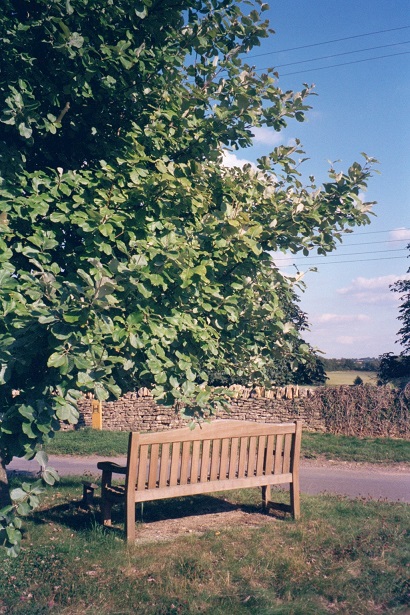 A profile for the politics section of the Guardian website on David Cameron and West Oxfordshire, the area covered by his Witney constituency, when he became Conservative party leader.
A profile for the politics section of the Guardian website on David Cameron and West Oxfordshire, the area covered by his Witney constituency, when he became Conservative party leader.
I still live in the area, and write about the likes of its tweeting chief policeman and the romance of its long-distance A-roads for community newspaper Chipping Norton News.
Simon Hoggart wrote that a book about life in Charlbury, a small town in David Cameron’s Witney constituency, had “a hypnotically dull quality, making you want to live somewhere where an abandoned Fanta can is a minor crisis”.
This is an exaggeration. However, Cameron’s west Oxfordshire constituency is quietly charming. It consists mostly of rolling countryside on the eastern edge of the Cotswolds, dotted with small towns and villages including Burford, Kingham – England’s favourite village, according to Country Life – and Combe, whose primary school recently topped England’s test results. In 2004, West Oxfordshire was the eighth least-deprived local authority area in England.
“When he speaks publicly, people go a little weak at the knees,” says Andrew Alexander, chief reporter of the Witney Gazette, of Cameron, adding that even constituents who didn’t vote Conservative compliment the MP for responding quickly to letters and emails.
Cameron has cultivated the local press, where he first used his now-familiar line on drug use, about being politician enough not to admit to everything he has done, in November 2001 when Henley MP Boris Johnson owned up to youthful cannabis use.
But Alexander says that Cameron goes beyond public relations. In October last year, he told parliament that the residents of Thameside Park, a mobile home park near Northmoor, had been pressured by the landlord to sell their homes well below their value, and urged for them to be better protected. The landlord sold up soon after. “It made it impossible for him to carry on,” says Alexander, who thinks Cameron’s intervention was decisive because of the publicity it generated.
Conservative councillor David Harvey, environment cabinet member for west Oxfordshire district council, mentions Cameron’s involvement in fighting the extension of a sewage works in Witney, which with 23,000 people is the constituency’s largest town. “There are the grand projects, but David’s also interested in the minutiae,” he says, mentioning that in the middle of the leadership campaign on November 25, Cameron turned on Witney’s Christmas lights with Professor Dumbledore.
Harvey, who vied with Cameron in 2001 to be Conservative candidate for Witney, describes the local party’s reaction to his leadership win as “tempered euphoria” – tempered by “knowing that he’s embarked on what will be a difficult road, but one we are confident he can successfully negotiate”.
Liz Leffman, who stood for the Liberal Democrats against Cameron in last May’s general election – a campaign she describes as “a very gentlemanly affair” – says he might have worked harder on local healthcare provision, particularly the future of Chipping Norton’s community hospital. “I’m not saying he hasn’t got involved, but it has been low key,” she says.
She concedes that he has been “vociferous” about the quality of service on the Cotswold train line, which runs across the constituency. In 2002, he supported a campaign for a second track – for much of its length the line really is a single line – and earlier this year, he questioned the transport secretary, Alistair Darling, about the botched introduction of a new timetable.
In a pre-election debate last April in Charlbury, Cameron talked about his local work before outlining national party policies, which he did without mentioning immigration. When questioned about the war in Iraq, he defended his support while conceding that part of his case, regarding weapons of mass destruction, had collapsed.
“He’s a very good speaker, very fluent,” Leffman says of his performance. “The one thing I was aware of at the time was that he’s never been someone who is very keen on talking about policy. He tended to talk about generalities. In a constituency like Witney, he can get away with that.”
The area, a safe Conservative seat, was represented by Douglas Hurd from 1974 to 1997, when Shaun Woodward took over. He crossed the floor to Labour in 1999, following his refusal to accept the party line on gay rights.
This was not forgotten by local Conservatives. In his maiden Commons speech in 2001, Cameron thanked his predecessor for providing domestic employment in the constituency through his ownership of the 15-bedroom Sarsden House, which Woodward has recently put up for sale: “On a clear day, from the hill behind my cottage, I can almost see some of the glittering spires of his great house.”
All MPs talk up their constituencies, but Cameron seems to find it easier than most. This week’s Witney Gazette, in a front-page story headed “It’s our David!”, quotes Cameron as intending to live half the week “in the part of the country I love best”. His constituency cottage is in Dean, a tiny village on a minor road and the former home of Ronnie Barker. It boasts both a tree planted for the Queen’s Silver Jubilee and a bench for the Golden Jubilee.
In May, Cameron spoke at the funeral of Dean farmer John Blackwell, whose body was drawn to church on his tractor’s trailer. According to the local paper, Cameron said: “I sit all day in parliament, working hard of course, but dreaming great dreams, hoping for great things.” But, he added, Blackwell saved the Oxfordshire breed of pig from extinction and lived in harmony with his home, his animals and the countryside: “Who can do more than all this?”
· SA Mathieson is a freelance journalist living in Charlbury
guardian.co.uk © Guardian News & Media Limited 2010
Published via the Guardian News Feed plugin for WordPress.
